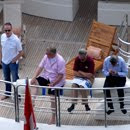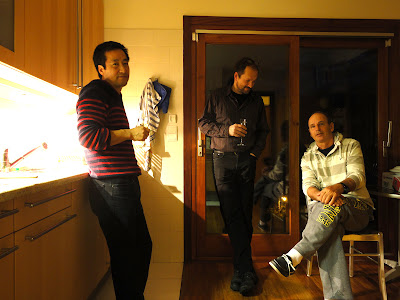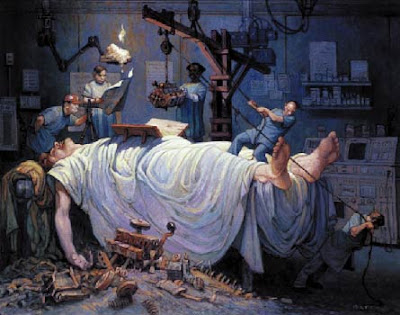A former minister of finance of France, he had been married to one of the most beautiful, intelligent, and richest women of the country: Anne Sinclair, who ran her own prime time talk show before they tied the knot. Nicolas Sarkozy, upon taking office, got him the top job at the International Monetary Fund, evidently to rid himself of a dangerous future rival for the second term of his presidency, but failed, as DSK grew in stature abroad and was topping the French polls in anticipation of the presidential elections of 2012.
And then, around 13:00 local time yesterday, a chamber maid entered Room 2806 of the Sofitel New York, 44 W Street — believing it unoccupied. The suite, which costs $3,000 a night, has a foyer, a conference room, a living room, a bedroom — and also a bathroom, from which a starkly naked Domique Strauss Kahn emanated and "attempted to sexually assault" her. "He grabs her [according to her account] and pulls her into the bedroom and onto the bed." Then, according to NYPD's Deputy Commissioner Paul Browne, he locked the door to the suite. (We think something is wrong with the sequence of events here, but never mind). "She fights him off, and then he drags her down the hallway to the bathroom, where he sexually assaults her a second time."
The woman breaks free, however, flees, tells another maid in the hallway who calls the police. When the police arrives, DSK has left, apparently in a hurry, since he left his cell phone behind, next to other DNA-relevant evidence, as the NYT darkly reports.
It quickly transpires that DSK is on an Air France plane. The plane is held at the gate, and an officer of the New York Port Authority arrests the IMF president in the First Class section of the plane (10,000 USD for a one-way ticked to Paris).
DSK was to meet Chancellor Angela Merkel today in Berlin, but the meeting has been cancelled.
| Dominique Strauss-Kahn (DSK) | "We have our spies" |
And then, around 13:00 local time yesterday, a chamber maid entered Room 2806 of the Sofitel New York, 44 W Street — believing it unoccupied. The suite, which costs $3,000 a night, has a foyer, a conference room, a living room, a bedroom — and also a bathroom, from which a starkly naked Domique Strauss Kahn emanated and "attempted to sexually assault" her. "He grabs her [according to her account] and pulls her into the bedroom and onto the bed." Then, according to NYPD's Deputy Commissioner Paul Browne, he locked the door to the suite. (We think something is wrong with the sequence of events here, but never mind). "She fights him off, and then he drags her down the hallway to the bathroom, where he sexually assaults her a second time."
The woman breaks free, however, flees, tells another maid in the hallway who calls the police. When the police arrives, DSK has left, apparently in a hurry, since he left his cell phone behind, next to other DNA-relevant evidence, as the NYT darkly reports.
It quickly transpires that DSK is on an Air France plane. The plane is held at the gate, and an officer of the New York Port Authority arrests the IMF president in the First Class section of the plane (10,000 USD for a one-way ticked to Paris).
DSK was to meet Chancellor Angela Merkel today in Berlin, but the meeting has been cancelled.



































